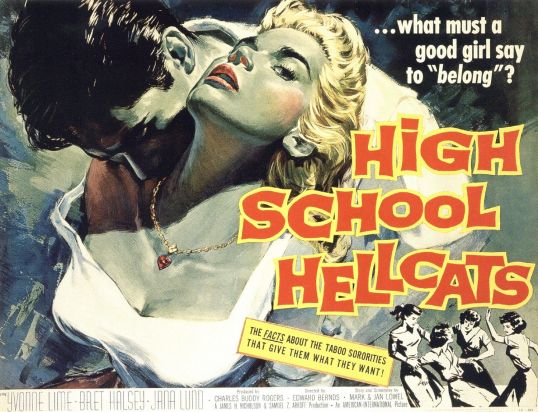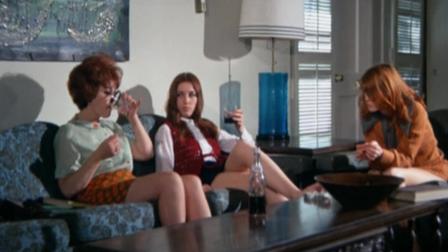2024’s Devil’s Knight opens in the kingdom of Veroka. A group of thieves all discuss what they’ve stolen over the course of the day. The leader of the thieves is named Orwell. Another thief — played by Daniel Baldwin — is named Camus. The group is joined by as stranger named Sigurd (John Wells), a man who has only one eye. He tells them the story of how he and his friends — The Lost Blades — were hired to vanquish the fearsome Bone Devil….
Yep, it’s one of those type of movies. There’s a lot of sword fights. There’s a lot of monsters. There’s a hint of sorcery, though not as much as you might expect from a movie like this. The thieves are named after philosophers. The huge cast is full of streaming stars and a handful of actors who are known for appearing in just about anything. Kevin Sorbo plays Baldur, the noble head of the king’s guards. Angie Everhart plays the Duchess who speaks French despite living in a mythical kingdom. Eric Roberts shows up as Lord Sussex. He only onscreen for a few minutes, though he does get a few funny lines. Sadly, Roberts doesn’t even get to fight a monster. At least Sorbo gets a big battle scene.
Here’s the thing, though. Taken on its own terms, Devil’s Knight is a lot of fun. You can tell it was made by people who have a genuine love for the sword and sorcery genre and there’s enough intentional humor to keep things interesting. With the exception of some blood splatter, there’s also a definite lack of CGI. The monsters are played by actual actors wearing costumes and under makeup and it’s surprisingly effective. The film’s plot is not always easy to follow. In the tradition of many medeival legends, the film’s story really is just one random incident after another, the majority of which lead to a fight and at least a few deaths. The cast is huge but few of the characters are still alive by the end of the movie. Monsters aren’t something to mess with and I actually appreciated that the film was willing to even kill off the characters who usually survive a film like this. It really did create the feeling that anyone could die if they ran into a monster in a hallway. (Even the stereotypical princess-who-wants-to-be-a-warrior character was taken in a surprising direction.) The film moves quickly with a lot of energy and enthusiasm. I enjoyed it.
Previous Eric Roberts Films That We Have Reviewed:
- Star 80 (1983)
- Runaway Train (1985)
- Blood Red (1989)
- The Ambulance (1990)
- The Lost Capone (1990)
- Love, Cheat, & Steal (1993)
- Voyage (1993)
- Love Is A Gun (1994)
- Sensation (1994)
- Dark Angel (1996)
- Doctor Who (1996)
- Most Wanted (1997)
- Mercy Streets (2000)
- Wolves of Wall Street (2002)
- Mr. Brightside (2004)
- Six: The Mark Unleased (2004)
- Hey You (2006)
- Amazing Racer (2009)
- In The Blink of an Eye (2009)
- Enemies Among Us (2010)
- The Expendables (2010)
- Sharktopus (2010)
- Beyond The Trophy (2012)
- The Dead Want Women (2012)
- Deadline (2012)
- The Mark (2012)
- Miss Atomic Bomb (2012)
- Bonnie And Clyde: Justified (2013)
- Lovelace (2013)
- The Mark: Redemption (2013)
- Self-Storage (2013)
- A Talking Cat!?! (2013)
- This Is Our Time (2013)
- Inherent Vice (2014)
- Road to the Open (2014)
- Rumors of War (2014)
- Amityville Death House (2015)
- A Fatal Obsession (2015)
- Stalked By My Doctor (2015)
- Enemy Within (2016)
- Joker’s Poltergeist (2016)
- Prayer Never Fails (2016)
- Stalked By My Doctor: The Return (2016)
- The Wrong Roommate (2016)
- Dark Image (2017)
- Black Wake (2018)
- Frank and Ava (2018)
- Stalked By My Doctor: Patient’s Revenge (2018)
- Clinton Island (2019)
- Monster Island (2019)
- The Reliant (2019)
- The Savant (2019)
- Seven Deadly Sins (2019)
- Stalked By My Doctor: A Sleepwalker’s Nightmare (2019)
- The Wrong Mommy (2019)
- Exodus of a Prodigal Son (2020)
- Free Lunch Express (2020)
- Her Deadly Groom (2020)
- Top Gunner (2020)
- Deadly Nightshade (2021)
- The Elevator (2021)
- Just What The Doctor Ordered (2021)
- Killer Advice (2021)
- The Poltergeist Diaries (2021)
- The Rebels of PT-218 (2021)
- A Town Called Parable (2021)
- Bleach (2022)
- My Dinner With Eric (2022)
- Aftermath (2024)
- The Wrong Life Coach (2024)
- When It Rains In L.A. (2025)





